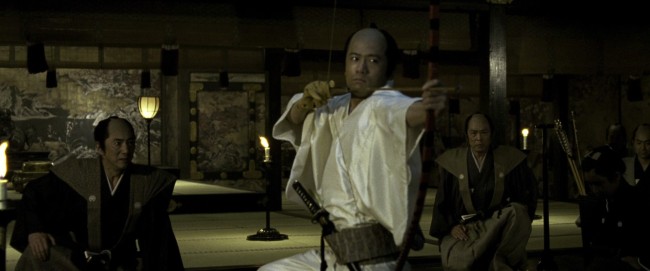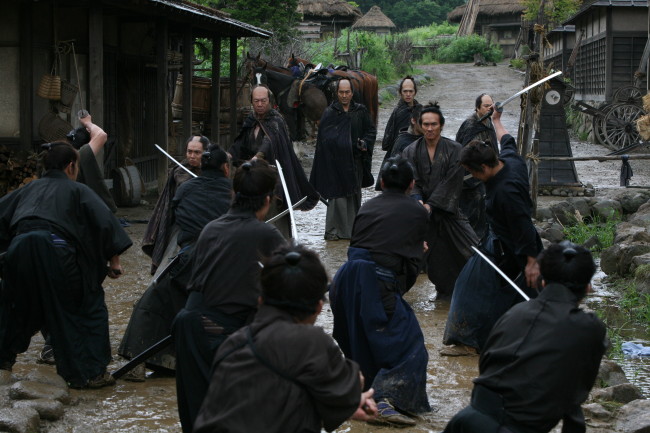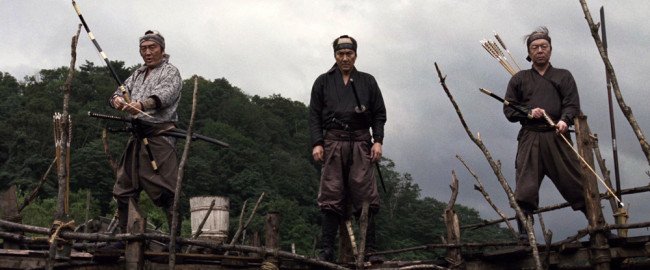By Mikhail Karadimov September 22nd, 2015
In honor of director Takashi Miike’s latest effort Yakuza Apocalypse—which unfortunately hasn’t received the hottest word of mouth from the Toronto International Film Festival—I’ve decided to use this opportunity to discuss one of Mr. Miike’s more popular movies:
13 Assassins.
Whatever happened to the legit villain? Why is it that every time Hollywood or any other film society decides to build us up a baddie the eventual results are either cool or boring? We get villainous charmers like the Joker, like Hans Gruber, like Raoul Silva, or we get dullards like Darth Maul and the Red Skull and any baddie from the Fast franchise (other than Jason Statham’s Looney Tunes turn as Ian Shaw), but rarely do we get a low-down despicable, totally hateable piece of shit like we do in Takashi Miike’s brilliantly bloody 13 Assassins.
This is the problem. It isn’t often that people—in real life (or as real as life is wont to get, depending on your perspective)—celebrate villains. Sure, we have our fair share of Pablo Escobar lovers of Charles Manson worshippers, but those people are in the minority. When we all went to see The Dark Knight all we could talk about was the incandescent charm of the Joker’s devilish sense of humor, of his “magic tricks”. Villains should scare us, they should piss us off with their unjust brand of justice. They should cause us to stand up and scream and pray for their demise. Morally speaking: they should cause all the ire in the world, they should cause us to unify as one and call for their swift capture and punishment. Their mere existence should bond us—the audience—in our drive for good.
Seems like Miike is the one of the few directors who understands this.
The director of Audition (99) and Visitor Q (01) is no stranger to the depraved. The man knows how to disturb, and how to do it sufficiently. He knows what gets our nerves peeling with shrill recoil. Although, typically, he keeps all the bad shit, all the violence, reserved for his protagonists, his “heroes”, his “anti heroes”. 13 Assassins is the first time I’ve seen him channel it into a focused and purely evil point. He channels all his greatest demons right into the ill will of one of the most deplorable baddies to ever cross the silver screen: Matsudaira Naritsugu (Goro Inagaki).
What’s great about this character’s wonton despicability, his torturous ways, is that he/it (whatever you want to call this monster) creates instant camaraderie between the viewer and the titular thirteen assassins. These aren’t the most developed characters. They can’t be. There’s only two hours to the movie, half of which is dedicated to one of film history’s greatest battle sequences. Within a half hour, Miike draws up Naritsguru’s sociopathic malevolence with several sequences of senseless bloodshed. He rapes one man’s wife, and then proceeds to decapitate the man in front of his wife; he practices archery by piercing the hearts and chests of an entire family (children included); and amputates a woman’s every limb in order to use her as his sexual ragdoll, only to discard her, casually, thoughtlessly—in the name of entertainment, of ennui. He kills to have fun, to feel something—whatever the fuck that may be.
It’s easy to rally behind the thirteen assassins’ mission mainly because there isn’t a single person who would find Naritsguru’s behavior NOT reprehensible. Even though I barely knew the men in charge of mowing this tyrant down, I respected and believed in their ultimate goal. When one of them fell in battle I felt it. I felt it because it meant one less man on the side of good, it meant Naritsguru had a better chance of getting away with his evil plans to bring Japan to its knees, to set off endless and senseless war.
It’s because of Miike’s talents, his eye for the morose, for the itty-gritty nuance of murder and rape, that I wanted to see Naritsguru squirm and shriek in pain. It’s because of Miike I was able to root for a cast of characters that were developed with the shortest bursts of characterization. An honorable move as a filmmaker—also: an economical one.
But hey: don’t get me wrong: I like my villains charming and cool and suave, too, I like them to be funny and to have deliciously twisty and troublesome (and funny) interactions with my gray-shaded heroes (a la The Dark Knight) but I also believe in the condemnation of murder and rape and self-indulgent anarchy. I believe in cheering against fictional (and non-fictional—of course) war mongers, especially when it gets me to involve myself more thoroughly, more deeply with my movies. And I think the movies needs more villains like this, villains who boil our blood, who get us chanting war cries, who get us bemoaning the state of affairs. Because people like Naritsguru exist and have existed and will continue to exist, even though they shouldn’t. And we need to remember this. War criminals like Naristguru need to be checked, they need to be vanquished or locked away and kept away forever and ever. We need to remember that not all villains are the coolest of the coolest, that they mean to do harm and to cause chaos. And that’s very much uncool.
For humanity’s sake: I hope you agree.








